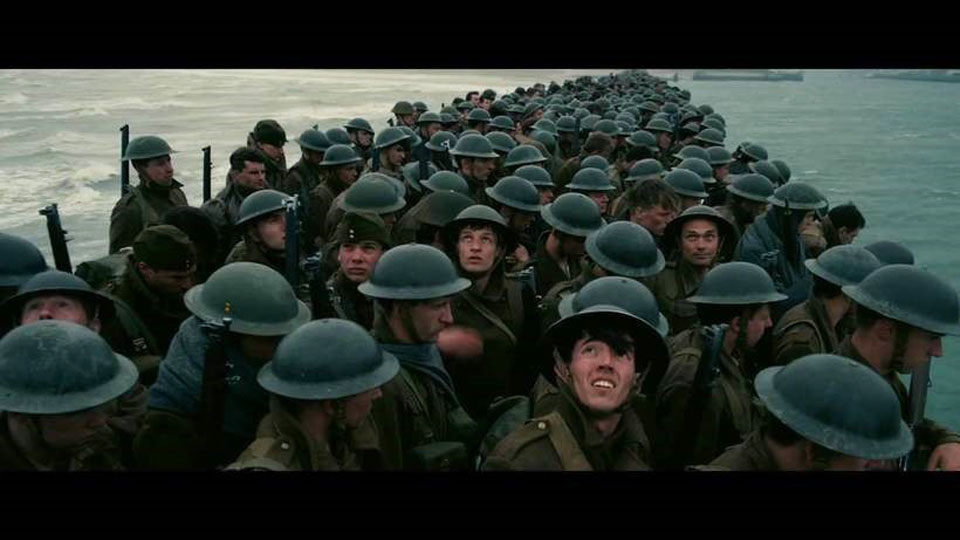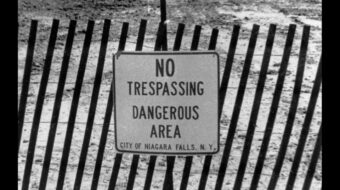
In the run up to the Academy Awards, two highly touted, vastly different popular films refocus attention on World War II. One film views the war through the lens of one man’s leadership. The other provides a broader perspective on the joint struggles of commoners against fascism.
Both films use as centerpiece the British attempt to rescue the bulk of the surrounded Allied army, four hundred thousand troops trapped on the beach of Dunkirk, the coastal city in the far north of France near the Belgian border. Would these forces be annihilated by the German Wehrmacht, the blitzkrieg from the Luftwaffe in the air and the huge, whirlwind strike forces on the ground?
The Darkest Hour is the story of Winston Churchill’s ascension to British prime minister and his decisions on rescuing these forces. Gary Oldham wrestles the role of Churchill to a draw. His re-creation is standard biopic flawed hero: Much huffing, puffing and heavy lifting to convince and outflank his parliamentary opponents around him—the misguided, less creative and even villainous. In a year where female performances strikingly overshadowed men’s work, Oldman is the favorite to win out not only over the Nazis, but to lay claim to the Oscar for Best Actor for this largely by-the-numbers resurrection of Hollywood’s great man caricature.
The film itself is dark indeed. It’s almost all shot dimly in black and white, claustrophobically indoors—Churchill’s home, Parliament, the War Rooms and the British Underground. In a disingenuously fabricated scene, Churchill takes his first ever ride on the London subway to get a sense of whether the commoners wanted him to pursue peace through negotiations or take a hard line to fight. Supposedly Churchill didn’t even know where to get off the mass transit to arrive at Parliament.
As an alternative to soaring battle scenes, Darkest Hour gives us political intrigue and interpersonal rivalries. Cameras pan in to uncomfortable close-ups and out to small portraitures of Churchill backlit at a distance, outlined in elevators or rooms, thickly black framed to show his isolation. The celebrated Churchillian oratory fails to soar to charisma. Still in these days of presidential inarticulateness, dissembling and incoherence, Oldham is at least as credible as the role demands.
In the end, Churchill is victorious. The Brits rescue most of their forces. Churchill appears to be what the country needs in wartime leadership. The film’s epilogue overzealously attributes all aspects of success to Churchill. In elevating Churchill, however, the focus on those who actually fought and won the war tends to get obscured.
Christopher Nolan’s Dunkirk provides an admirable corrective. Nolan abandons his usual chronological mayhem of chopping the narrative to mix time lapses (Memento, Inception, Interstellar). Instead he gives audiences the straight-ahead story in three-part harmony: from the land, sea and air. Beach-bound soldiers fight back against the German land onslaught. In the air above, the Royal Air Force tries to provide cover by engaging the would-be bombers of the Luftwaffe. On the water, the largely volunteer flotilla risked their lives to rescue the beached Allied forces.
In each of his tripartite treatments, Nolan provides rich characterizations of ordinary people falling to fear, cowardice and bias, and rising to compassion and great heroism. In the most memorable, Mark Rylance as a middle-aged non-combatant volunteer skippers his small boat into great danger because it is the right thing to do. Nolan’s moral tales crafted against the backdrop of battle show us more about who won the war, than the blustery, hyperventilating politicians who ordered up the fighting.
The focus of both Dunkirk (trailer here) and The Darkest Hour (trailer here) is on the war in Western Europe. Although neither film contracts to go beyond its chosen scope, no consideration should fail to even mention that WWII was not won here, but on the Eastern Front. Britain’s great heroism was a holding action. As the current U.S. government wavers in its defense of democracy, it is worth remembering that it was on the line from Leningrad to Moscow to Stalingrad that ordinary men and women defeated fascism.












Comments